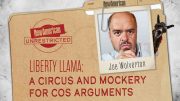
Days ago, the Obama administration demonstrated its dedication to the indefinite detention of Americans, as authorized by the National Defense Authorization Act (NDAA) by submitting a brief asking a federal judge to throw out a case challenging the constitutionality of that provision.
Among other astonishing arguments made by the Justice Department, this paragraph from page 9 is exceptionally unconstitutional:
On March 13, 2009, the government submitted its definition of detainable individuals under the AUMF to the United States District Court for the District of Columbia in the ongoing habeas corpus litigation brought by detainees held at Guantánamo Bay, Cuba … that definition includes … persons who were part of, or substantially supported, Taliban or al-Qaida forces or associated forces that are engaged in hostilities against the United States or its coalition partners, including any person who has committed a belligerent act, or has directly supported hostilities, in aid of such enemy armed forces.
The DOJ goes on to assert that since the NDAA does nothing more than restate authority already granted to the federal government in the Authorization for the Use of Military Force (AUMF), the plaintiffs lack standing; that is to say, they will be unable to demonstrate that the harm they claim to have suffered is related to the NDAA.
As readers will recall, Pulitzer Prize-winning journalist Chris Hedges is joined as a plaintiff in a lawsuit challenging the NDAA by a coterie of other prominent writers and commentators. Noam Chomsky, Daniel Ellsberg, and Icelandic politician Birgitta Jonsdottir all signed on to add their witness to that of Hedges that the fear of indefinite detention lurked within the shadows of vagueness of key terms in the NDAA.
The principal allegation made by the plaintiffs against the NDAA was that the vagueness of those critical terms could be interpreted by the federal government in a way that authorizes them to label journalists and political activists who interview or support outspoken critics of the Obama administration’s policies as “covered persons,” meaning that they have given “substantial support” to terrorists or other “associated groups.”
According to the text of Section 1021 of the NDAA, the president may authorize the armed forces to indefinitely detain:
A person who was a part of or substantially supported al-Qaeda, the Taliban, or associated forces that are engaged in hostilities against the United States or its coalition partners, including any person who has committed a belligerent act or has directly supported such hostilities in aid of such enemy forces.
Fearing that this section could be applied to journalists and that the specter of such a scenario would have a chilling effect on free speech and freedom of the press in violation of the First Amendment, Hedges filed his lawsuit on January 12, 2012.
Hedges’ complaint claims that his extensive work overseas, particularly in the Middle East covering terrorist (or suspected terrorist) organizations, could cause him to be categorized as a “covered person” who, by way of such writings, interviews and/or communications, “substantially supported” or “directly supported” “al-Qaeda, the Taliban, or associated forces that are engaged in hostilities against the United States or its coalition partners,… under §1031(b)(2) and the AUMF [Authorization for Use of Military Force].”
Specifically, Hedges alleges that it is precisely the existence of these “nebulous terms” — terms that are critical to the interpretation and execution of the immense authority granted to the president by the NDAA — that could allow him or someone in a substantially similar situation to be classified as an enemy combatant and sent away indefinitely to a military detainment center without access to an attorney or habeas corpus relief.
On May 16, 2012 Judge Katherine Forrest of the U.S. District Court for the Southern District of New York issued a preliminary injunction preventing the Obama administration from exercising the indefinite detention authority granted the president by Section 1021 of the NDAA.
In the 68-page opinion accompanying the temporary injunction order, Judge Forrest disagreed with the federal government’s argument that the relevant provisions of the NDAA merely restate existing law. She wrote: “Section 1021 is not merely an ‘affirmation’ of the AUMF [Authorization for the Use of Military Force].”
Pointing out that were the AUMF and Section 1021 identical, then the latter would be redundant, Judge Forrest held:
Section 1021 lacks what are standard definitional aspects of similar legislation that define scope with specificity. It also lacks the critical component of requiring that one found to be in violation of its provisions must have acted with some amount of scienter — i.e., that an alleged violator’s conduct must have been, in some fashion, “knowing.” Section 1021 tries to do too much with too little — it lacks the minimal requirements of definition and scienter that could easily have been added, or could be added, to allow it to pass Constitutional muster.
Scienter is defined as “a state of mind often required to hold a person legally accountable for his or her acts.” In other words, the indefinite detention provisions of the NDAA are too vague and aren’t specific enough to permit a person to know whether he or she has violated the law.
While admitting that preventing the federal government from enforcing a congressional act is a sober matter that must be attended to with caution, Judge Forrest writes that “it is the responsibility of our judicial system to protect the public from acts of Congress which infringe upon constitutional rights.”
In its appeal, the federal government argued that in cases dealing with “militants” and those offering “substantial support” to them, indefinite detention without due process is appropriate.
In September 2012, a panel of three judges heard the motion filed by the Obama administration and in their ruling they point to “flaws within the scope and rationale” of the permanent injunction issued earlier by Judge Forrest.
“We conclude that the public interest weighs in favor of granting the government’s motion for a stay,” write Judges Denny Chin, Raymond Lohier, and Christopher Droney in their order fast-tracking the appeal of the earlier injunction.
Hedges and his co-plaintiffs had until April 10 to file a response to the Obama administration’s request that the suit be dismissed. A copy of the plaintiff’s response was not available at press time.
Regardless of how the court rules, Hedges vows to fight on. In an interview with Mint Press, Hedges said, “We don’t want to give the government this kind of power because they will use it.” He added that he believes that the “elite are preparing legal mechanisms in which they can use wholesale surveillance and arbitrary detention to maintain order.”
In an article he wrote for TruthDig, Hedges put a fine and frightening point on what’s at stake in his challenge to the NDAA and the president’s usurpation of power to apprehend and indefinitely detain anyone he decides is a threat to the security of “the homeland.”
“This law, if it is not struck down, will essentially replace our civilian judiciary with a military one,” Hedges wrote. “Those targeted under this law will not be warned beforehand that they will be arrested. They will not have a chance to get a lawyer. They will not see the inside of a courtroom. They will simply vanish.”
Joe A. Wolverton, II, J.D. is a correspondent for The New American and travels nationwide speaking on nullification, the Second Amendment, the surveillance state, and other constitutional issues. Follow him on Twitter @TNAJoeWolverton and he can be reached at [email protected].




